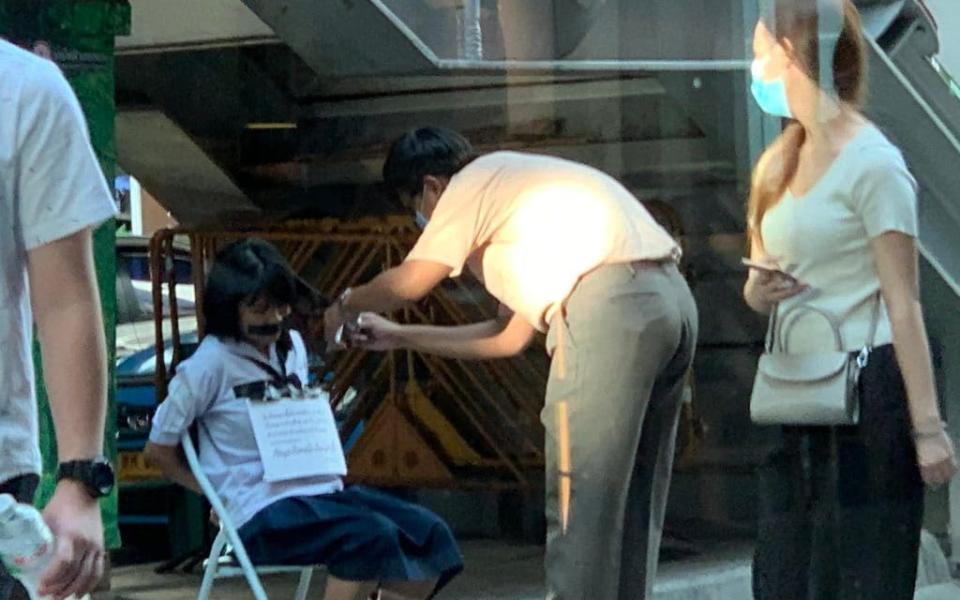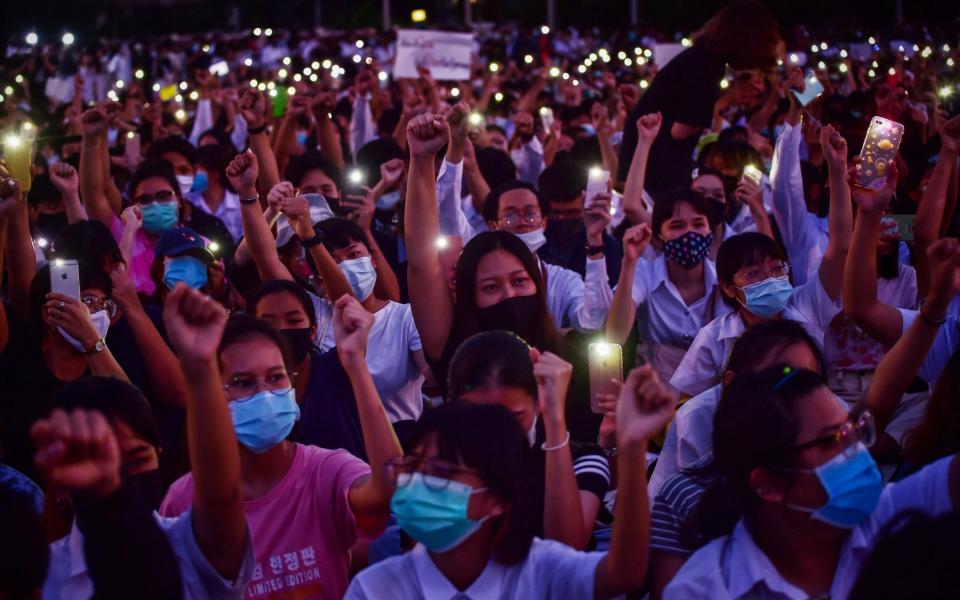Thai school pupils take to the streets over haircut humiliations

Thai school pupils, fed up of draconian classroom laws that dictate even the length of their hair, have joined the anti-government protests that have been sweeping through the Southeast Asian nation.
The current protests’ roots lie in elections last year that many believe were unfairly weighted to ensure victory for Prayuth Chan-ocha, the former general who seized power in a military coup in 2014.
Nine protesters have been arrested this week, among them Anon Nampa, a lawyer charged over a Harry Potter-themed protest in the capital, Bangkok, during which he called for reform of the monarchy, revered as a sacred institution and protected by strict lese majeste laws.
The silencing of the younger generation has become a major complaint among activists, who have been demonstrating for weeks.

Videos of girls having their cut aggressively cut in front of their peers have gone viral, prompting younger teenagers to take to the streets.
One clip that prompted outrage shows a crying 15-year-old girl standing on a stage having her hair hacked off by a teacher, before falling to her knees.
In what has become a vibrant protest movement, Thai students have adopted a three-finger salute borrowed from the Hunger Games as a sign of defiance. During the months of rallies they have called for an end to harassment of government critics and for changes to a constitution that critics say helps to secure the army’s influence over politics.
But it is their bold demand for checks and balances on Thailand’s powerful monarchy, previously considered an untouchable subject, that sets this pro-democracy movement apart.
A student gets their hair cut on stage to demonstrate Thai schools’ “unnecessary” haircut laws #ขีดเส้นตายไล่เผด็จการ #WhatsHappeningInThailand #แท็กเพื่อนไปม็อบ #ให้มันจบที่รุ่นเรา #ให้มันจบที่รุ่นเรา #เยาวชนปลดแอก #ประชาชนปลดแอก #MilkTeaAlliance pic.twitter.com/hIHNv6L1t2
— Teirra Kamolva... (@Teirrabyte) August 16, 2020
Netiwit Chotiphatphaisal, one of Thailand’s most prominent student activists, told The Sunday Telegraph that the government’s mishandling of the economy, in particular, had caused young people to rise up. While Thailand has escaped a mass Covid-19 outbreak during the pandemic, the economy is now in freefall.
Young people indoctrinated by an education system that promotes military values as the way to succeed, now had nothing to lose, he argued.
“After Covid-19 and the failed leadership of the government they think that if they still follow military values, it won’t get them anywhere. Now they are turning against it as they think if they do not, there will be no future for them.”

The high profile arrests this week were an “authoritarian” tactic to frighten people off the streets, said Mr Chotiphatphaisal, but he predicted that momentum would continue to build through September and October, with protesters emboldened by support on social media.
This week, high-school pupils followed the example of university students, and hundreds of whistle-blowing teenagers marched on the education ministry, demanding an audience with Nataphol Teepsuwan, the minister.
School students share the goals of their older counterparts, but are also seeking to abolish militaristic practices in classrooms aimed to curb dissent and encourage conformity.
Among the rules pupils want abolished are strict regulations on haircuts that mandate crew cuts for boys and bobs no longer than earlobes for girls. The video of the girl crying as a teacher cuts off her hair is indicative of the humiliation young people say they feel.
The 15-year-old, who has not been named to protect her identity, says she was given written approval to have her hair shoulder-length, and tied back with a ribbon.
Student movements in #Thailand are using white ribbons, three-finger salutes, whistles, enthusiasm and hope for the future to spark change from the grassroots level, all the way up.#เลิกเรียนไปกระทรวง #ไปต่อแถว#WhatsHappeningInThailand pic.twitter.com/AkgtikZ8Mx
— Tracy Beattie (@tracingtheworld) August 19, 2020
When she returned to school, however, her hair was hacked off as an example to other students, to stop them asking if they could also wear their hair as they liked.
Pupils wanted their voices to be heard, said a spokesperson for the “Bad Student” group behind the high school revolt.
“Many children have come forward to demand the improvement of the Thai education system, [in terms of] rights, bullying, curriculum, power structure, violence, threats, but these things are ignored.”
“The problem with the current military government is that it has made no attempt whatsoever to understand or listen to the needs of the younger generation, said Tracy Beattie, an analyst with the Australian Strategic Policy Institute.
“What the government needs to realise is that Thais are changing very quickly, and it can no longer maintain the status quo… Even if they don’t listen now, they eventually will have to because I can’t see any way in which this whole movement will go backwards.”

 Yahoo Movies
Yahoo Movies 
